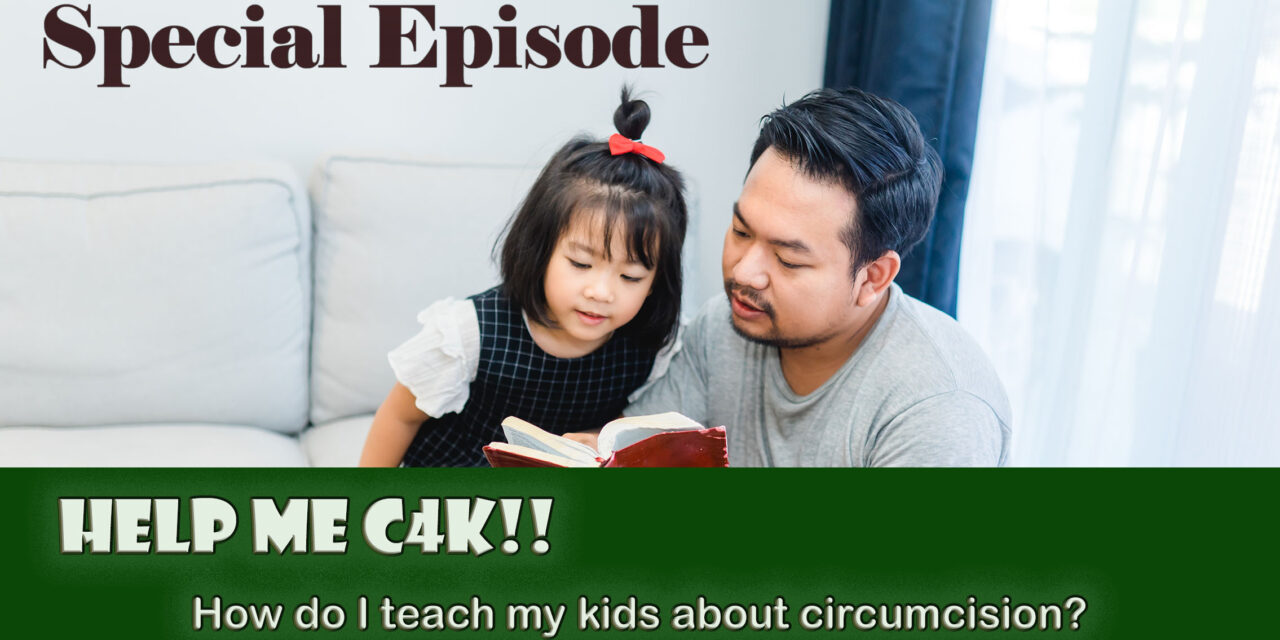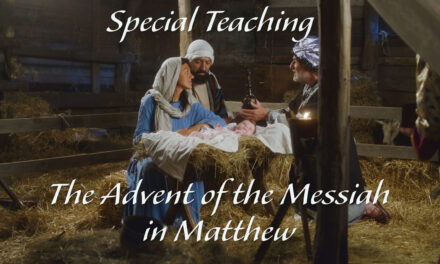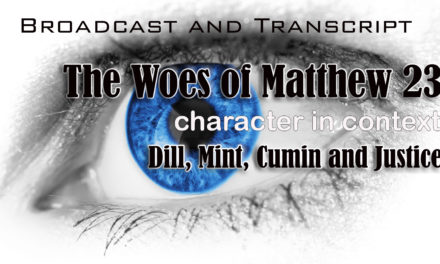Or maybe you think they don’t need to learn about Circumcision. Fair enough, but I can’t teach them anything about Genesis 17 and the foundation of the Land Grant Covenant without dealing with it. Neither of us can teach them about the important Scriptural meta-narrative of the circumcision of the heart that they will need to understand in order to live as disciples in the New Creation life we want for them. I will also be talking frankly about the importance of being open and honest with our kids about body parts and sex because if we can’t do that, then they won’t have adequate guides in us for learning the Bible. And when they do have questions, they will find someone else. In addition, I also talk about the importance of calling things what they are, without shame, and how it prevents sexual abuse.
(My affiliate links for Amazon products are included in the post. As an Amazon Associate, I earn from qualifying purchases.)
If you can’t see the podcast player, click here. If you are interested in the longer YouTube version, click here.
Hey there, and now for something completely different. When I began teaching the kids Genesis in October 2020, I knew the day would come when I would have to decide how to handle some truly risqué and even horrifying sexual material with the kids. Since I don’t really look good in an ankle bracelet, my solution is to teach parents the background material, which will allow me to be deliberate and cautious with how I handle the material for kids–skipping over what I need to skip over. I wrote a book called Context for Adults: Sexuality, Social Identity and Kinship Relations in the Bible (affiliate link) where I covered some of this sort of material for the sake of parents hopefully being able to answer the hard questions as they came up. But something I didn’t talk about, because there is nothing horrible about it, is the circumcision commandment that I can’t teach Genesis 17 without talking about. If you are anything like me, then this isn’t a big deal and you don’t mind talking about it (I suppose it’s the scientist in me) but I know that a lot of you parents were raised not only to be very ashamed of your sexuality (I think that’s just my generation in general had that problem) but to not call things by their names, which can be very damaging to a person’s ability to communicate sexual assault and even just normal medical problems—no matter what age they are. Folks, they are just body parts like anything else and talking about them like they are normal helps, and doesn’t hinder, us in keeping our kids safe from harm and discouraging premarital relations. Euphemisms can be very dangerous and destructive in our modern society and we need to get it through our skulls that Bible kids weren’t sheltered.
Now, my kids were taught the unfiltered Torah portions once they hit the age of eleven—and I would have done it earlier if I had been teaching it to them earlier than that. It isn’t like they are editing them in the Synagogue. The Bible is an insanely violent and sexual book—in all the wrong ways—and believe me, you want your kids exploring this material with someone they can trust and not opening up the Bible in private one day and coming across this stuff without a lot of hand holding and guidance. Last time I taught one of these was after Utah schools decided to ban a ton of books under the banner of protecting kids from inappropriate knowledge of sex. Well, the day it happened, I was like, “Oh man, what are the Christians and Mormons going to say when the first book to go is the Bible because I know that wasn’t their intent!” And wouldn’t you know it, BAM, that’s exactly what happened and how can anyone even defend having material like that in the School library when stuff that is so much milder has been tossed out? The Bible talks about whacked stuff when it comes to sex, no matter how hard we might try to hide it.
So anyway, being able to talk to our kids about the embarrassing stuff we wish wasn’t even in the Bible is a whole lot easier when we can talk about the stuff that was never supposed to be embarrassing—like the topic of Genesis 17, the circumcision aspect of Abram’s Covenant. Something so important and central to the identity of Israel’s men that Abram’s name is formally changed to Abraham right before the commandment is given. Talking about this isn’t optional and as long as we are able to talk to our kids in healthy ways about all of our body parts, male and female, this really isn’t going to be a problem for them or for us. Let me give you an example from my own life.
When my twins were five, they came to me—super serious—and asked me how babies get inside the mommies. In my family, this was a genuine mystery because they had zero experience with pregnancy and babies being born as I was always capable of getting pregnant but never making it past the first few months of pregnancy. Of course, when they went to friends’ houses, it was an entirely different situation and now they were very curious. So, they asked me; I answered in the most age-appropriate way I could think of, “Well, the daddies put them in there, of course.” They looked at each other and were satisfied with my answer. For three whole years. At the age of eight, they still vividly remembered the conversation as though it had happened the day before and they came to me and asked—super serious— “How do the daddies put the babies in the mommies.” To tell you the truth, I was quite impressed that the conversation was so vivid in their memories and that they were coming to me (hopefully) first. Parents, you need to know that when your kids can ask the question, if you don’t tell them the truth then someone else will. Someone you can’t control. I asked them—super serious— “Once you know you can never ‘not know’ again—are you sure you want to know?” They assured me that they were and so I told them, using all the names of all the body parts. When I was done, they walked away, huddling together and whispering as twins are wont to do. Three weeks later, they returned and asked a very unexpected question, “We’re adopted, right?”
Well, I was floored. “Of course, you are adopted, you guys have known Mamma Stephanie and the whole story since you were babies.” I couldn’t have been more confused about where things were going with this, lemme tell ya. But the look on their faces was one of pure relief. “We just knew you would never do something like that with Dad…” and they walked away happily until they turned eleven and somehow it dawned on them that I wasn’t actually a virgin. And I can tell you that my sons, twenty-two years old, still come to me with the tough and embarrassing questions—a fact for which I am grateful. I still talk to them about sex, and they are willing to have those conversations as I teach them how to be good husbands to happy wives instead of selfish idiots. And moms, their dads aren’t the ones who can tell them what it is like to be a woman and how to care for us and about us in ways that are meaningful inside and outside the bedroom—that’s all on us. Too many marriage books have been written from the very narrow perspective of what a man wants and expects from a woman. If we want blessed daughters-in-law and the best possible chance at happy marriages for our sons and intact homes for our grandbabies, we have to be there to speak for them. It’s never too late to have a healthy relationship with our kids where they know they can trust us with whatever is going on in their lives. No, they will never tell us everything but it is important for them to know that they can. The more embarrassed we are, the more curious they will be. But boys who know about the struggles their wives might have before they are married aren’t going to act like spoiled, selfish brats on their wedding night if their wives are too exhausted, scared, or intimidated to have sex. Or if they have a medical condition that makes sex impossible without medical intervention. Do not allow their only information about sex to come from other men—not even their dads.
Anyway, so Genesis 17 is founded upon the bedrock of the ritual of circumcision that was introduced to Abram when he was eighty-nine years old and Ishmael was thirteen. But Abram wasn’t ignorant of it, it was not an unknown practice in the ancient world and especially among the priesthood of the nations of the ancient Near East. In fact, we have knowledge of circumcision among the priests in Egypt and I have to imagine that when Joseph successfully interpreted Pharaoh’s dream, one of the reasons he was immediately trusted to undertake the grain storage project and given the daughter of a priest in marriage is because when they were bathing and shaving him from head to toe, they discovered he was circumcised. In their eyes, he came to them as a priest of the Most High—one of the many gods in their shared world that they might have knowledge of. I once had a preacher claim that Joseph could prove his identity to his brothers by showing them his circumcision but there would have been nothing strange about that as he was a priest in Egypt himself, one who hears and speaks for the gods. If he had whipped out his penis to show them his circumcision, they would have been likely alarmed that he was about to sexually assault them (to shame them) as in the tale of Seth and Horus, not that he was proving his identity. People come up with some truly oddball ideas when they don’t know the context of the ancient world.
And if you are disturbed by the word penis, I want to ask why? The Bible certainly doesn’t shy away from the word or the concept. Foreskin is used five times in this chapter and if your kids can’t understand the idea of circumcision, which is mentioned ten times in this chapter, then there is no way for them to relate to the utterly foundational concept of the circumcision of the heart to the metanarrative of the Bible. And that knowledge cannot be skipped over. In fact, circumcision gets mentioned more in the New Testament than in the old. Hamstringing our kids by not teaching them about a surgical procedure because we don’t like to mention the body part involved is ludicrous—and all of y’all who have kids know what a penis is and what it is used for, okay? If you can make use of it, or even wipe it clean or have one go off in your face while changing a diaper, then saying it should be a piece of cake. It’s a body part and nothing to be ashamed of. I tell you one thing for sure, little boys don’t start out being bashful about it. I resorted to telling my kids that mine froze and snapped off when I was little to get them to stop trying to escape out the door when it was snowing. Okay, I didn’t have to but it was funny. We all laugh about it now. Normalize the sacredness and lack of shame about body parts. As a matter of fact, a female relative of mine—when she was growing up, her family was so nonchalant about the whole thing that when she married, she was not only a virgin but today enjoys an incredible sex life because she wasn’t saddled with shame or fear over it. But, back to talking about circumcision.
So, Abram would have known about the circumcision of priests—you know, I imagine men are always going to talk about something like that and glad it isn’t them—but the circumcision of all the regular, everyday males of a household was just unprecedented. I mean, slaves as well. What the heck? Yahweh was setting apart everyone associated with Abram. Yahweh was beginning the process of making the camp holy, or kadosh. This meant that Abram’s camp would begin to be different from the rest of the ancient Near Eastern world. One thing we do know specifically about the Canaanites, Abram’s nearest neighbors, is that they didn’t practice either child or adult circumcision—in fact, they are routinely referred to as “uncircumcised” throughout the Torah and there has been nothing unearthed through archaeology making any references to the followers of El or Ba’al being circumcised even as priests. The Egyptians, however, even show the circumcision process of adult males in their artwork. The tomb of Ankhmahor is called the “doctor’s tomb” because the walls are carved with sometimes graphic depictions of medical procedures. The most famous of these is of a circumcision, about five hundred years before the life of Abraham. I am including the link to a video of the relief in the transcript. It’s super cool.
Circumcision in the household of Abram was a sign and symbol of the Covenant to give Abram and his descendants the Land—hence the reason why Abram was renamed Abraham right before the commandment to circumcise was given. Abraham was given a new identity, and the command to circumcise everyone bound to his household, in preparation for his offspring becoming a nation of priests. The command to circumcise was even for Ishmael, despite God not finding him an acceptable heir. Likely this had nothing to do with Ishmael but with the circumstances of his existing at all, which we talked about in our last special episode. Yahweh would be honoring both Hagar and her son Ishmael, and they would be the source of many great nations and kings after Hagar acquired an Egyptian wife for him.
Circumcision was one of the nine covenant signs between Yahweh and His people: (1) the rainbow (Gen 9), (2) circumcision (Gen 17), (3) removal of the leaven for the Passover and the week of Unleavened Bread (Ex 13:3-10), (4) the dedication of the firstborn—people and animals (Ex 13:15-17), (5) the Sabbath (Ex 31:13-17), (6) the destruction of the bronze censors at the Tabernacle after the revolt against Aaron by Korah and his buddies (Num 16), (7) Aaron’s rod sprouting in the wilderness after the challenge by the heads of the other tribes of Israel (Num 17), (8) the memorial stones that Joshua set up in the Land of Israel (Joshua 8), and (9) the commandments as a sign on the back of the hand and on the forehead (Deut 6:8). These specific signs were given as proof of God’s choices. God chose to save humanity instead of destroying it, witnessed by the rainbow. Abraham’s offspring were chosen to be a special nation, but only through Isaac and Jacob (even though all his descendants were circumcised). The children of Jacob were chosen to be freed from bondage in Egypt in such a way that they left without time for their dough to rise. They and those who joined them at Sinai were chosen and given the covenant and the Sabbath, the dedication of their firstborn, and the commandments to make them wise. Aaron and his descendants were chosen for the priesthood and given the sole responsibility of the service of the Tabernacle and the tithes. The children of Israel were given the Land of Canaan. Each one of these choices was backed up by signs—and especially when we see how Yahweh defended His choice of Aaron as High Priest.
But the first major sign of God doing a new thing in the earth to bring forth the Messiah was the circumcision not just of the children, but of the people of Abraham. Abraham would have understood that he was being made into a nation of priests through the miracle of a child born to Sarah, his wife. What we do not know for sure is why people started doing this in the first place, long before Abraham was born. Was it about purity or just plain old status? We don’t know and can only guess. But it really doesn’t matter because by the time God gave it as a special sign to His people, it meant something very concrete, very holy. It meant that a man was set apart as a priest. It did not mean that every man of Israel was an actual functioning priest, but it was symbolic of the fact that every man and every woman descended from Abraham was of priestly lineage and therefore their prayers could be heard without mediation from the time they were children. If you listened to the Yom Kippur prayers this week along with me, you likely heard this very thing stated. It gave them a status in life higher than all the nations around them—much like the wearing of tassels which were a symbol of wealth and status among the other nations. I was thrilled to death when I went to the St Louis Museum of Art, and I saw a relief from the Palace of Assurbanipal II with a winged divine figure wearing tassels that went down almost to the danged floor. I about wept. So cool. Yahweh did everything He could to extend dignity to His people and the whole “be holy because I am holy” was a message to the nation that He gave them dignity because without it they couldn’t be His representatives in the world. They weren’t all that and a bag of chips, they were chosen to represent all that and a bag of chips. Same goes for us, folks.
All this goes to say is that the Bible isn’t the least bit shy about our bodies or about reproduction and dang some of the rhetoric in the prophets is profoundly disturbing (I’m talking to you, Ezekiel, with your X-rated chapter 23!). The Bible presupposes that the people reading it and hearing about it are acutely aware of sex and how and why it happens. Not only were they an agricultural society, but there is no real privacy for a married couple from the kids in tents or houses that small, okay? The neighbors knew everyone’s business. Really, this bashfulness is very much a modern European phenomenon (but most certainly not from the French) and it has never truly served us well but has perpetuated inappropriate shame, mystery, and confusion. How can we say that something is both sacred and shameful? This shame hampers our Bible studies and prevents us from raising children who can talk about their bodies and not be inappropriately ashamed if someone violates them. Let’s make sure we aren’t protecting kids from concepts that were actually given to protect them when we are as open about it as the Bible is. Call things what they are and then you won’t have to edit out things like circumcision, a basic medical procedure that shouldn’t be embarrassing to anyone. Kids who have someone in the immediate family they can talk to about anything are safer than those who only have non-family members who they talk to about anything. You will not hear about sexual abuse from a child whom you have instructed, through shame, to be so humiliated to talk about their bodies that they can’t work through the confusion of molestation feeling bad and being psychologically damaging but also sometimes feeling pleasurable. They need to know what is natural, feeling pleasure, versus what is unnatural, being used by an adult or another child. This knowledge isn’t giving them over to the ‘liberal establishment” but it will protect them from abuse.
As parents and grandparents and aunts and uncles and human beings, we have a sacred obligation to protect children but only parents can give them the knowledge they need to be empowered against abuse and realize that they haven’t done anything wrong when faced with a situation where they are going to lack the wisdom and physical ability to say no. We rightly call this rape, when there is a power differential between two people that is being abused. Think of David using his guards to haul Bathsheba from her required mikvah into his palace while having no male protection at home. Think of Amnon along with his young teenage sister Tamar (hopefully she was a teenager but she might have been younger). Think of what the men of Sodom were doing in overwhelming and overpowering foreign visitors. Think of what the Benjamites were doing to their fellow Israelites by using the same tactics. If we see it as rape today because there was no ability to consent because there was no ability to say no, then it was rape then as well.
Anyway, if this is something you need help teaching your kids about, check out my teaching on holiness, circumcision, and signs in the Bible over on my Context for Kids channel this week.





















